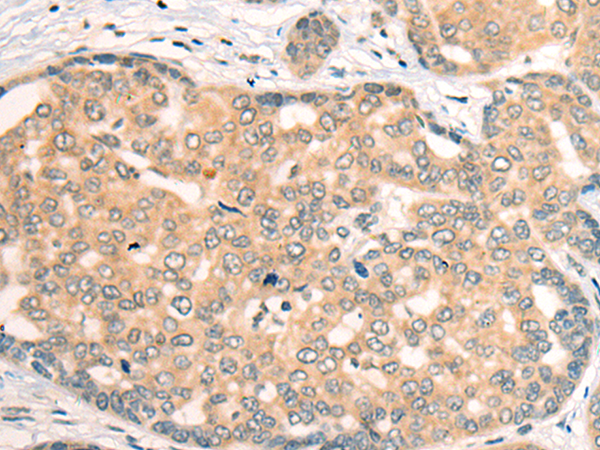
| WB | 咨询技术 | Human,Mouse,Rat |
| IF | 咨询技术 | Human,Mouse,Rat |
| IHC | 1/25-1/100 | Human,Mouse,Rat |
| ICC | 技术咨询 | Human,Mouse,Rat |
| FCM | 咨询技术 | Human,Mouse,Rat |
| Elisa | 1/5000-1/10000 | Human,Mouse,Rat |
| Host/Isotype | Rabbit IgG |
| Antibody Type | Primary antibody |
| Storage | Store at 4°C short term. Aliquot and store at -20°C long term. Avoid freeze/thaw cycles. |
| Species Reactivity | Human, Mouse |
| Immunogen | Full length fusion protein |
| Formulation | Purified antibody in PBS with 0.05% sodium azide and 50% glycerol. |
+ +
以下是关于CDKAL1抗体的3篇参考文献及其摘要概括:
---
1. **文献名称**:*CDKAL1 influences insulin response and risk of type 2 diabetes*
**作者**:Steinthorsdottir, V. et al.
**摘要**:该研究通过全基因组关联分析发现CDKAL1基因变异与2型糖尿病风险显著相关。文中使用CDKAL1特异性抗体检测了其在胰岛β细胞中的表达,发现其表达水平降低可能影响胰岛素分泌功能。
2. **文献名称**:*CDKAL1 regulates glucose-stimulated insulin secretion by modulating transcriptional activity in pancreatic β-cells*
**作者**:Wei, F.Y. et al.
**摘要**:研究通过Western blot和免疫荧光技术(使用CDKAL1抗体)揭示CDKAL1通过调控转录因子活性影响β细胞的胰岛素分泌能力,其缺失导致葡萄糖敏感性下降。
3. **文献名称**:*Molecular characterization of CDKAL1 variants in type 2 diabetes susceptibility*
**作者**:Kawai, V.K. et al.
**摘要**:本研究利用CDKAL1抗体进行蛋白定位和功能实验,发现其通过与tRNA修饰酶相互作用调控蛋白质翻译,从而影响β细胞功能及糖尿病病理机制。
---
**备注**:部分研究未在摘要中明确提及抗体使用,但根据方法学推断其可能涉及CDKAL1抗体进行蛋白检测或功能分析。如需更详细文献信息,建议通过PubMed或Google Scholar以关键词“CDKAL1 antibody”或“CDKAL1 protein analysis”进一步检索。
The CDKAL1 (Cyclin-Dependent Kinase 5 Regulatory Subunit-Associated Protein 1-Like 1) gene has garnered significant attention due to its association with type 2 diabetes (T2D) and other metabolic disorders. Genome-wide studies identified CDKAL1 as a susceptibility locus for T2D, particularly influencing insulin secretion in pancreatic β-cells. The encoded protein shares homology with CDK5 regulatory subunit-associated protein 1 (CDK5RAP1), a methylthiotransferase involved in tRNA modification. CDKAL1 is proposed to function similarly, modifying tRNA molecules to ensure accurate translation of proinsulin and other proteins critical for β-cell function. Defects in CDKAL1 disrupt this process, leading to impaired insulin production and secretion.
CDKAL1 antibodies are tools used to study the protein's expression, localization, and role in disease. They enable detection of CDKAL1 in tissues (e.g., pancreatic islets) via techniques like Western blotting, immunohistochemistry, or immunofluorescence. Research using these antibodies has linked altered CDKAL1 levels to β-cell dysfunction, insulin resistance, and even cancer progression. Additionally, CDKAL1 antibodies may help explore its interaction with other molecules, such as cyclin-dependent kinases or tRNA-modifying enzymes.
Challenges include the protein's low abundance and potential isoform diversity, necessitating highly specific antibodies. Further studies using these reagents could clarify CDKAL1's molecular mechanisms and therapeutic potential in diabetes and related conditions.
×